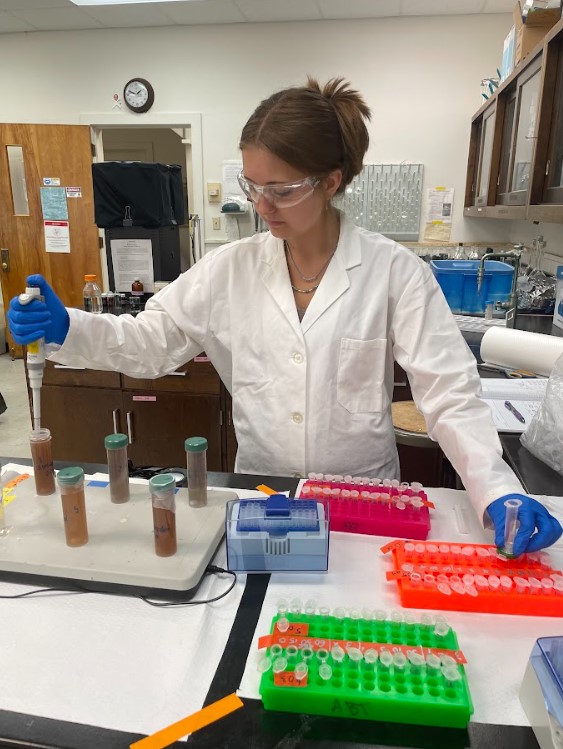When too much water hinders water research
By Jessica Alcorn, Freshwater Collaborative summer research student
This summer, 31 students from across the country were chosen for the University of Wisconsin-Madison’s Freshwater@UW Summer Research Opportunities Program, which is affiliated with Wisconsin Sea Grant, the University of Wisconsin Water Resources Institute and the University of Wisconsin-Madison Graduate School. Many of the students provided reflections on what they learned. We’ll share several over the coming months. Here’s the second, from Jessica Alcorn, an undergraduate senior in general chemistry from Northwest Missouri State University.

Jessica Alcorn. Image credit: unkKinetics
Since I was young, I was interested in chemistry and the environment, and was certain I would end up in a science field. I get much of my inspiration and passion for the environment from my grandfather. He was a hydrologist for the USGS and never failed to discuss his current research with his grandkids any opportunity he had.
As I entered my senior year, I was hoping to earn opportunities and gain experiences that would help me achieve my goals, which include earning a Ph.D. Near the end of the fall 2022 semester, I began searching for summer research programs at universities around the Midwest. The Freshwater Collaborative Program immediately stuck out to me because of the interdisciplinary emphasis in water research. By participating in this program, I hoped to get hands-on laboratory experience, and learn what graduate school research is like. This program exceeded all expectations, was a great experience, and solidified my plans for attending graduate school.
Throughout this summer, my eyes were opened to what graduate school can really be like. Many things did not go as expected, meaning plans were constantly being adjusted and changed. The biggest, unexpected event that occurred during my time here was the flood in the Water Science and Engineering Laboratory (WSEL).
For my project, I performed a chemical synthesis that produces chlorine gas. Because of this, the synthesis needed to be done in a chemical fume hood. There are only two fume hoods in WSEL that are at the proper grading to support chlorine gas, both of which were on the second floor. On this day, I had just finished my synthesis, put the sash up, and left the room to begin washing the solutions. In the short time I was gone, the sash failed and crashed down, causing the water main to burst. Water gushed from the wall inside and outside of the fume hood. Within minutes, the floor was covered and water was leaking through the floor all the way to the sub-basement.
The flood made it so I was unable to perform another synthesis at WSEL, it also hindered the work I was doing in my main wet lab. Because of this, I got a few days behind on my research plan. I had to take extra steps to do my everyday tasks. To perform another synthesis, my graduate student mentor and I transported all the necessary equipment and materials across campus to the Geoscience Building, where we gained permission to use their fume hood. I also moved much of my equipment to a different lab in WSEL to continue performing work without the flood damage and maintenance equipment in the way.
Through this experience, I was able to understand how to conduct research, but also how to be flexible when unexpected events occur. Science comes with many uncontrollable events; this experience taught me to persevere and continue making progress through adverse situations.


